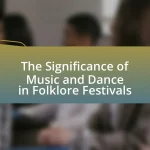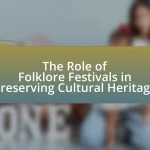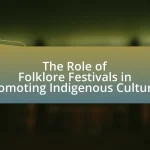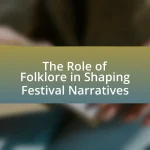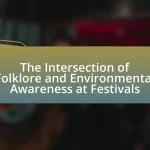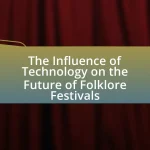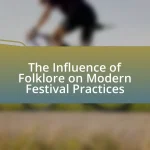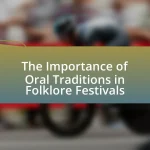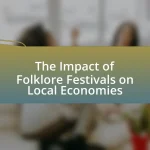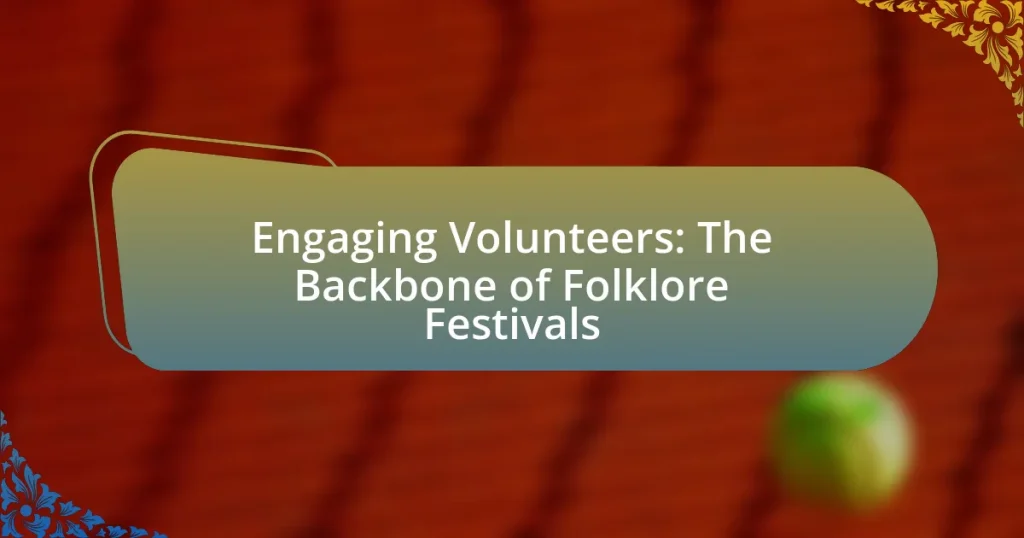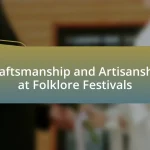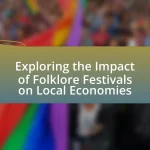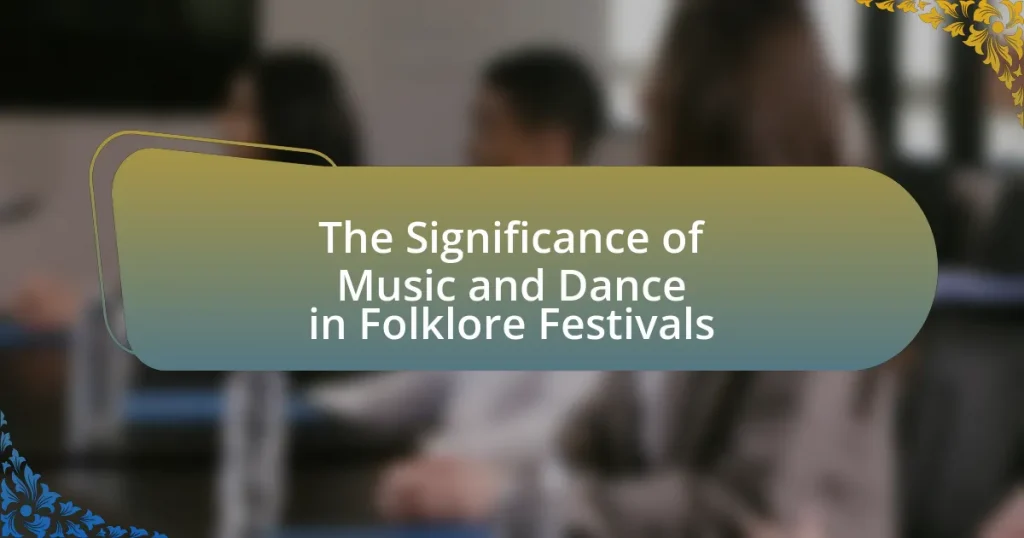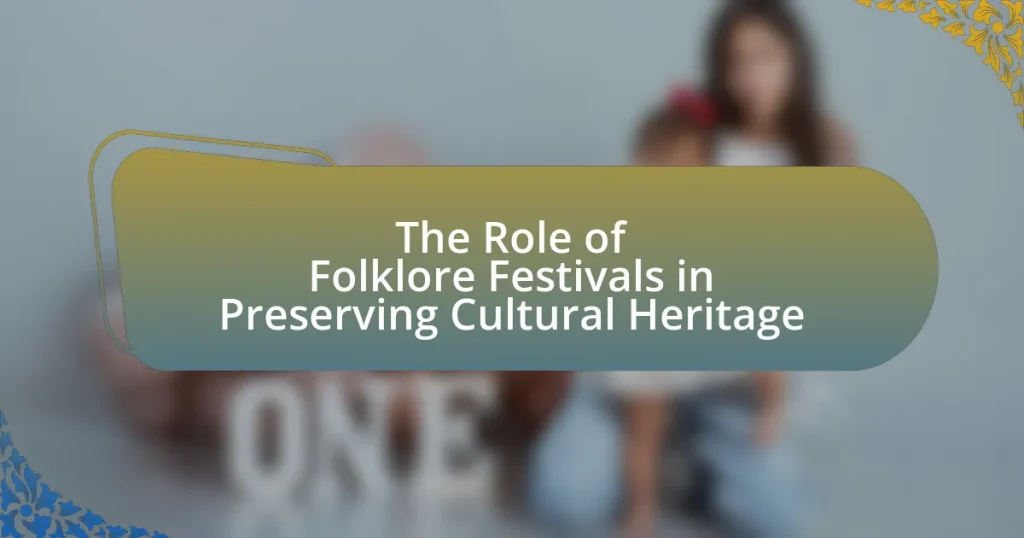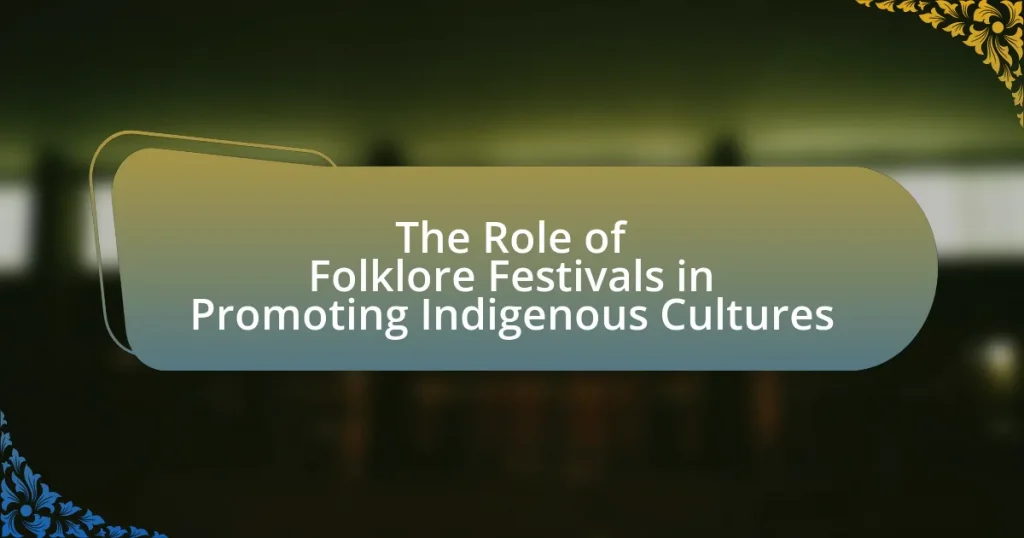Volunteers are essential to the success of folklore festivals, providing critical support in logistics, crowd management, and cultural education. Their involvement enhances the festival experience for attendees, fosters community engagement, and helps preserve local traditions. The article explores the various roles volunteers play, the skills they bring, and the impact of their engagement on community involvement. It also addresses strategies for recruiting and retaining volunteers, the challenges faced in volunteer management, and best practices for creating a positive experience for volunteers. Overall, the article emphasizes the importance of volunteers as the backbone of folklore festivals.
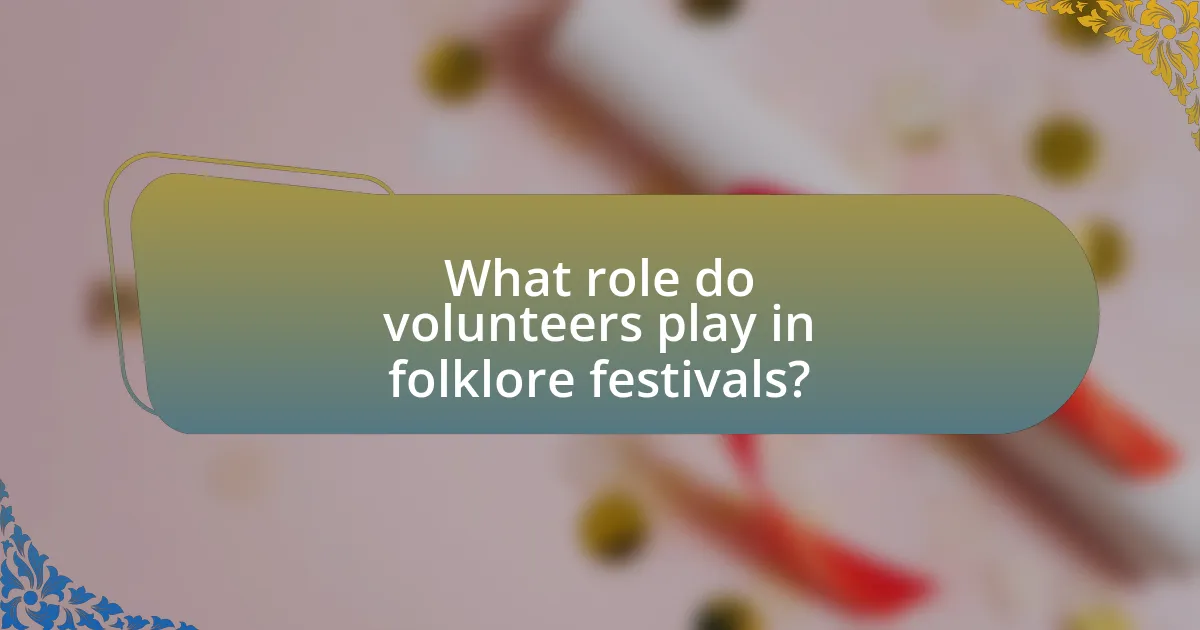
What role do volunteers play in folklore festivals?
Volunteers play a crucial role in folklore festivals by providing essential support in various operational areas. They assist with event logistics, including setting up venues, managing crowd control, and facilitating activities, which ensures the smooth execution of the festival. According to a study by the National Endowment for the Arts, community engagement through volunteerism enhances the cultural experience and fosters a sense of belonging among participants. This involvement not only enriches the festival atmosphere but also helps preserve and promote local traditions and heritage.
How do volunteers contribute to the success of folklore festivals?
Volunteers significantly contribute to the success of folklore festivals by providing essential support in various operational roles. They assist with event logistics, such as setting up stages, managing crowd control, and facilitating activities, which ensures that the festival runs smoothly. For instance, a study by the National Endowment for the Arts highlights that festivals with active volunteer participation report higher attendee satisfaction and operational efficiency. Additionally, volunteers often serve as cultural ambassadors, helping to educate attendees about the traditions and significance of the performances, thereby enhancing the overall experience. Their involvement not only reduces operational costs but also fosters community engagement, making folklore festivals more vibrant and inclusive.
What specific tasks do volunteers typically perform at these events?
Volunteers at folklore festivals typically perform tasks such as event setup and breakdown, assisting with registration, managing information booths, guiding attendees, and facilitating activities. These roles are essential for ensuring the smooth operation of the festival, as they help create an organized environment for both participants and visitors. For instance, during the setup phase, volunteers may arrange seating, set up stages, and prepare vendor areas, which directly contributes to the festival’s overall success. Additionally, volunteers often provide critical support in managing crowd flow and enhancing the attendee experience, which is vital for maintaining a welcoming atmosphere at such cultural events.
How does volunteer involvement enhance the festival experience for attendees?
Volunteer involvement enhances the festival experience for attendees by fostering a sense of community and providing personalized interactions. Volunteers often serve as local ambassadors, sharing insights about the festival’s cultural significance and guiding attendees through various activities. This engagement not only enriches the attendees’ understanding of the festival but also creates a welcoming atmosphere that encourages participation. Studies have shown that festivals with active volunteer programs report higher satisfaction rates among attendees, as volunteers contribute to smoother operations and enhance the overall enjoyment of the event.
Why are volunteers considered the backbone of folklore festivals?
Volunteers are considered the backbone of folklore festivals because they provide essential support and resources that enable these events to occur. Their contributions include organizing activities, managing logistics, and facilitating interactions between performers and audiences, which are critical for the festival’s success. According to a study by the National Endowment for the Arts, over 70% of festival operations rely on volunteer efforts, highlighting their indispensable role in maintaining the cultural and community aspects of these celebrations.
What unique skills do volunteers bring to folklore festivals?
Volunteers bring diverse skills to folklore festivals, including organizational abilities, cultural knowledge, and interpersonal communication. Organizational skills enable volunteers to manage logistics, coordinate activities, and ensure smooth event execution, which is crucial for the success of large-scale festivals. Cultural knowledge allows volunteers to engage authentically with traditions and practices, enhancing the festival’s educational value. Interpersonal communication skills facilitate effective interaction with attendees, performers, and other volunteers, fostering a welcoming atmosphere. These skills collectively contribute to the overall experience and operational efficiency of folklore festivals.
How does volunteer engagement impact community involvement in folklore festivals?
Volunteer engagement significantly enhances community involvement in folklore festivals by fostering a sense of ownership and connection among participants. When individuals volunteer, they actively contribute to the planning and execution of the festival, which increases their investment in the event’s success. Research indicates that festivals with high volunteer participation often see greater community attendance and support, as volunteers serve as ambassadors who promote the event within their networks. For instance, a study by the National Endowment for the Arts found that community festivals with robust volunteer programs reported a 30% increase in local attendance compared to those with minimal volunteer involvement. This correlation underscores the vital role that engaged volunteers play in mobilizing community interest and participation in folklore festivals.
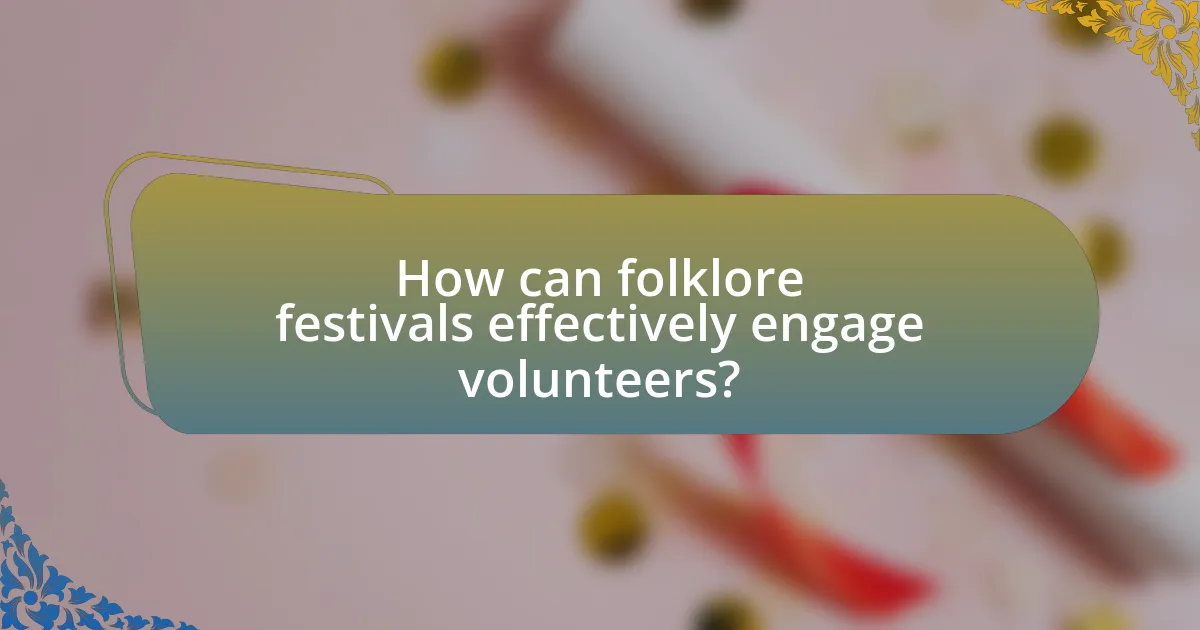
How can folklore festivals effectively engage volunteers?
Folklore festivals can effectively engage volunteers by creating meaningful roles that align with their interests and skills. By offering diverse opportunities such as event planning, logistics, and cultural demonstrations, festivals can attract a wide range of participants. Research indicates that volunteers are more likely to remain engaged when they feel their contributions are valued and impactful, as shown in a study by the Corporation for National and Community Service, which found that 70% of volunteers reported increased satisfaction when they were involved in tasks that matched their personal interests. Additionally, fostering a sense of community through team-building activities and recognition programs can enhance volunteer retention and motivation, as evidenced by successful festivals that prioritize volunteer appreciation events.
What strategies can be implemented to recruit volunteers?
To recruit volunteers effectively, organizations can implement targeted outreach strategies, such as leveraging social media platforms to reach specific demographics. Research indicates that 70% of volunteers are motivated by social connections, highlighting the importance of community engagement through local events and partnerships with schools or community groups. Additionally, offering clear roles, training, and recognition can enhance volunteer retention and satisfaction, as evidenced by a study from the Corporation for National and Community Service, which found that structured volunteer programs lead to higher engagement levels.
How can social media be utilized to attract potential volunteers?
Social media can be utilized to attract potential volunteers by creating targeted campaigns that highlight the benefits and impact of volunteering at folklore festivals. These campaigns can include engaging content such as testimonials from past volunteers, visually appealing images of festival activities, and clear calls to action that encourage sign-ups. Research indicates that 79% of volunteers are motivated by the opportunity to make a difference, which can be effectively communicated through social media platforms. Additionally, using specific hashtags related to the festival can increase visibility and reach, attracting individuals who are passionate about community engagement and cultural preservation.
What role do partnerships with local organizations play in volunteer recruitment?
Partnerships with local organizations significantly enhance volunteer recruitment by leveraging established community networks and resources. These collaborations allow festival organizers to tap into the local organization’s existing volunteer base, increasing outreach and engagement. For instance, a study by the National Council of Nonprofits indicates that organizations with strong local partnerships see a 30% increase in volunteer participation, as these partnerships foster trust and credibility within the community. Additionally, local organizations often have insights into the interests and motivations of potential volunteers, enabling tailored recruitment strategies that resonate more effectively with the community.
How can festivals retain volunteers for future events?
Festivals can retain volunteers for future events by implementing effective communication and recognition strategies. Regularly engaging volunteers through updates, feedback sessions, and appreciation events fosters a sense of belonging and commitment. Research indicates that recognition significantly boosts volunteer retention; for instance, a study by the Corporation for National and Community Service found that volunteers who feel appreciated are 50% more likely to return for future events. Additionally, providing opportunities for skill development and leadership roles can enhance volunteers’ experience, making them more likely to participate again.
What recognition and rewards can be offered to volunteers?
Recognition and rewards for volunteers can include certificates of appreciation, public acknowledgment during events, and small tokens of gratitude such as gift cards or merchandise. These forms of recognition not only validate the efforts of volunteers but also enhance their sense of belonging and commitment to the organization. Research indicates that recognition significantly boosts volunteer retention rates, with studies showing that organizations that actively recognize their volunteers experience a 50% higher retention rate compared to those that do not.
How can feedback from volunteers improve future engagement?
Feedback from volunteers can significantly improve future engagement by identifying areas for enhancement and fostering a sense of community. When volunteers provide insights on their experiences, organizations can tailor their programs to better meet the needs and expectations of participants. For instance, a study by the National Council for Voluntary Organizations found that organizations that actively seek and implement volunteer feedback see a 30% increase in volunteer retention rates. This demonstrates that incorporating volunteer suggestions leads to more effective engagement strategies, ultimately enhancing the overall experience for future volunteers.
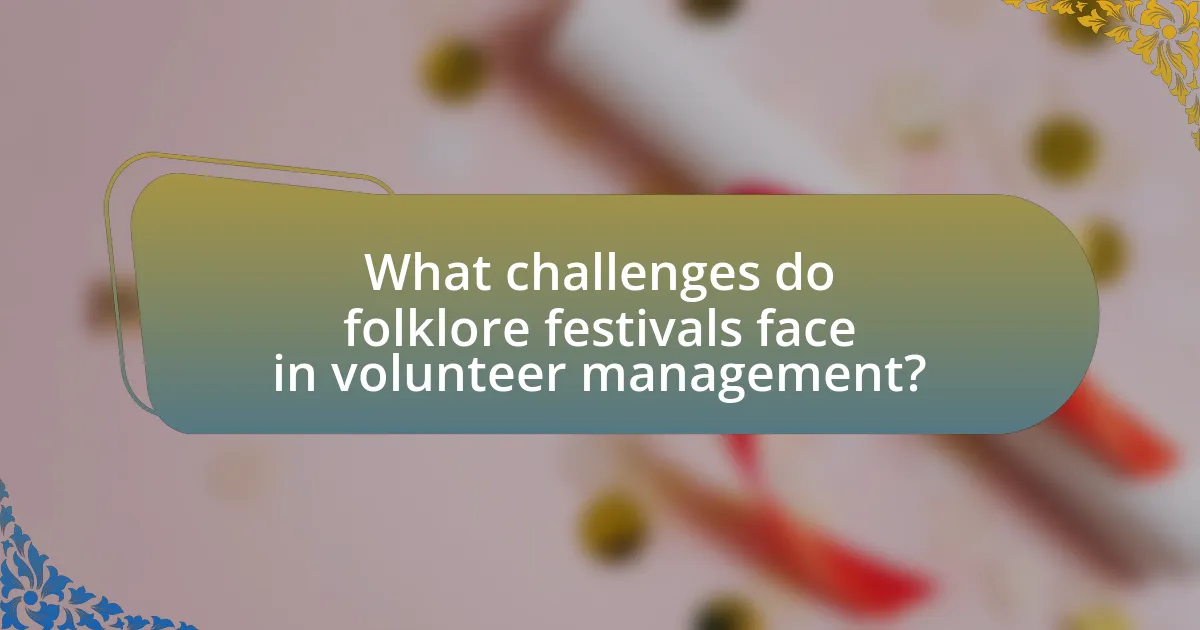
What challenges do folklore festivals face in volunteer management?
Folklore festivals face significant challenges in volunteer management, primarily due to recruitment, retention, and training issues. Recruitment can be difficult as festivals often rely on a limited pool of volunteers, leading to competition for available individuals. Retention poses another challenge, as volunteers may lose interest or become disengaged if they do not feel valued or adequately supported. Training is also critical; inadequate preparation can result in volunteers feeling overwhelmed or unprepared for their roles, which can negatively impact the festival’s overall success. These challenges are supported by studies indicating that effective volunteer management strategies, such as recognition programs and comprehensive training, can significantly enhance volunteer engagement and satisfaction.
What common obstacles hinder effective volunteer engagement?
Common obstacles that hinder effective volunteer engagement include lack of clear communication, insufficient training, and inadequate recognition. Clear communication is essential for volunteers to understand their roles and responsibilities; without it, confusion and frustration can arise, leading to disengagement. Insufficient training can leave volunteers feeling unprepared and unsupported, which diminishes their confidence and effectiveness. Additionally, inadequate recognition of volunteers’ contributions can result in low morale and a lack of motivation to continue participating. Research indicates that organizations that prioritize communication, training, and recognition see higher volunteer retention rates and satisfaction levels.
How can festivals address issues of volunteer burnout?
Festivals can address issues of volunteer burnout by implementing structured support systems and providing adequate training. Structured support systems, such as regular check-ins and feedback sessions, help volunteers feel valued and connected, reducing feelings of isolation and stress. Additionally, providing comprehensive training equips volunteers with the skills and confidence needed to perform their roles effectively, which can alleviate anxiety and prevent burnout. Research indicates that festivals that prioritize volunteer well-being through these methods report lower turnover rates and higher volunteer satisfaction, demonstrating the effectiveness of these strategies in maintaining a motivated volunteer base.
What strategies can be employed to manage volunteer expectations?
To manage volunteer expectations effectively, clear communication is essential. Establishing transparent roles and responsibilities ensures that volunteers understand their tasks and the impact of their contributions. Regular check-ins and feedback sessions can help address any concerns and reinforce their importance to the festival’s success. Additionally, providing training and resources equips volunteers with the necessary skills, fostering confidence and satisfaction in their roles. Research indicates that organizations with structured volunteer management practices report higher volunteer retention rates, demonstrating the effectiveness of these strategies in maintaining positive volunteer experiences.
How can festivals ensure a positive experience for volunteers?
Festivals can ensure a positive experience for volunteers by providing clear communication, adequate training, and recognition of their contributions. Clear communication helps volunteers understand their roles and responsibilities, which reduces confusion and enhances their engagement. Adequate training equips volunteers with the necessary skills and knowledge to perform their tasks effectively, leading to increased confidence and satisfaction. Recognition of their contributions, such as through awards or public acknowledgment, fosters a sense of belonging and appreciation, which is crucial for volunteer retention. Studies show that organizations that actively recognize volunteers see a 50% increase in volunteer satisfaction and commitment.
What training and support should be provided to volunteers?
Volunteers should receive comprehensive training that includes orientation on festival operations, safety protocols, and specific roles they will undertake. This training ensures that volunteers are well-prepared to contribute effectively and safely to the festival environment. Additionally, ongoing support should be provided through regular check-ins, access to resources, and opportunities for feedback, which fosters a sense of community and encourages volunteer retention. Research indicates that organizations with structured training programs see a 50% increase in volunteer satisfaction and engagement, highlighting the importance of these support mechanisms in enhancing the overall festival experience.
How can communication be improved between festival organizers and volunteers?
Communication can be improved between festival organizers and volunteers by implementing structured communication channels and regular updates. Establishing dedicated platforms, such as group messaging apps or project management tools, allows for real-time information sharing and feedback. Regular briefings and debriefings before and after events ensure that all parties are aligned on expectations and responsibilities. Research indicates that effective communication increases volunteer satisfaction and retention, as seen in studies conducted by the National Volunteer Center, which found that organizations with clear communication strategies reported a 30% higher volunteer engagement rate.
What are best practices for engaging volunteers in folklore festivals?
Best practices for engaging volunteers in folklore festivals include clear communication, meaningful roles, and recognition of contributions. Clear communication ensures that volunteers understand their responsibilities and the festival’s goals, which can enhance their commitment and performance. Assigning meaningful roles that align with volunteers’ interests and skills fosters a sense of ownership and satisfaction, leading to higher engagement levels. Additionally, recognizing volunteers’ contributions through appreciation events or awards can motivate them to continue their involvement. Research indicates that festivals with structured volunteer programs see a 30% increase in volunteer retention rates, demonstrating the effectiveness of these practices.
How can festivals create a welcoming environment for new volunteers?
Festivals can create a welcoming environment for new volunteers by implementing structured orientation programs that provide clear information about roles and responsibilities. These programs help new volunteers feel informed and valued from the outset, fostering a sense of belonging. Additionally, festivals can assign experienced volunteers as mentors to guide newcomers, which has been shown to enhance engagement and retention rates. Research indicates that mentorship in volunteer settings increases satisfaction and commitment, as evidenced by a study published in the Journal of Volunteer Administration, which found that 70% of volunteers reported feeling more connected when paired with a mentor. Furthermore, creating inclusive social events for volunteers encourages relationship-building and community, making new volunteers feel more integrated into the festival culture.
What ongoing engagement strategies can be implemented post-festival?
Ongoing engagement strategies that can be implemented post-festival include regular communication through newsletters, social media updates, and personalized follow-ups. These strategies help maintain a connection with volunteers, ensuring they feel valued and informed about future opportunities. For instance, sending out a survey to gather feedback on their festival experience can enhance their sense of involvement and provide insights for improvement. Additionally, organizing post-festival appreciation events or recognition programs can foster a sense of community and encourage volunteers to participate in future festivals. Research shows that consistent engagement increases volunteer retention rates, with studies indicating that organizations that maintain regular contact with volunteers see a 50% higher likelihood of repeat participation.
